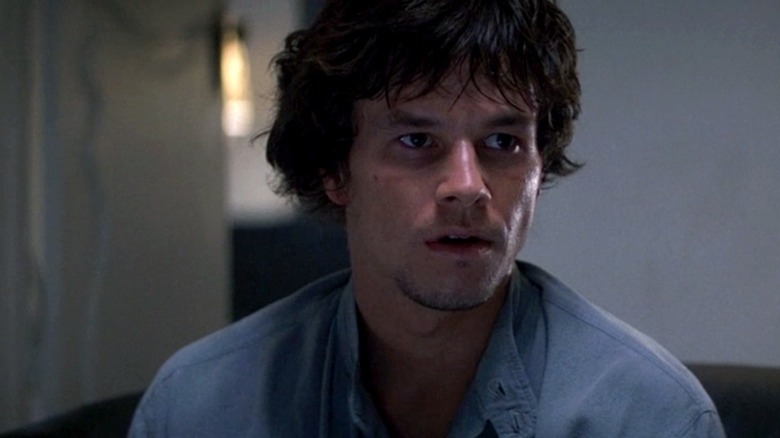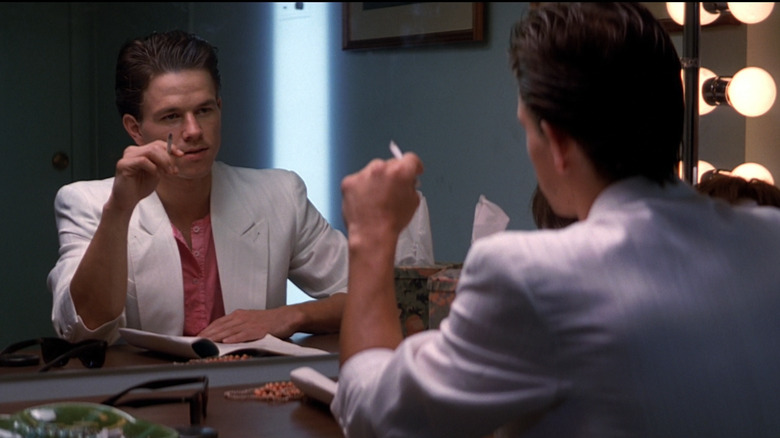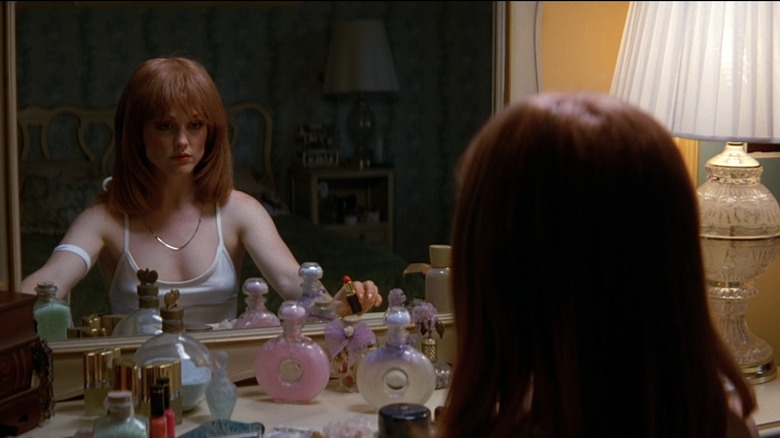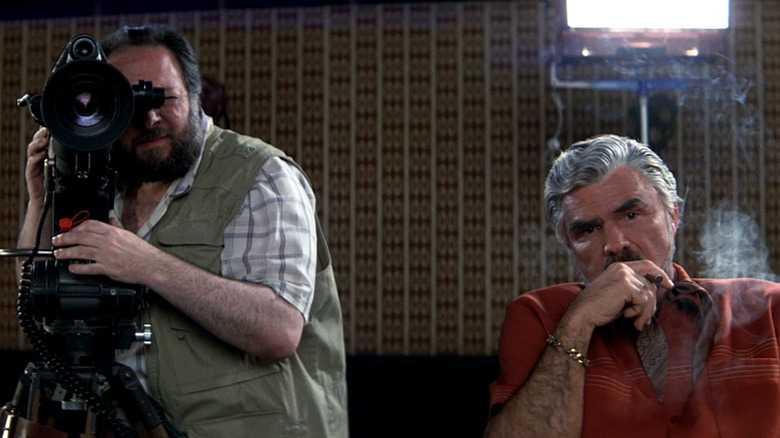Boogie Nights Ending Explained: Hanging In And Hanging Out
With the release of Paul Thomas Anderson's new film "Licorice Pizza" fast approaching, a reexamination of his similarly '70s-set breakout "Boogie Nights" feels appropriate. Though packed with unyielding moments of exhilaration and intrigue throughout its 155 minute runtime, the film's ending drives home sorrowful sentiments on the collapse of the "Golden Age" of filmmaking — both pornographic and commercial — as well as containing the jaw-dropping reveal of Dirk Diggler's (Mark Wahlberg) impressive prosthetic member.
As a directorial wunderkind (only 27 at the time of filming), Anderson imbues "Boogie Nights" with a critique of the industry seemingly wise beyond his years. Though only 10-years-old when the decade closed out, Anderson looks back on the '70s with dual admiration and remorse for what the cinematic landscape has subsequently lost: originality, provocation, engagement with social movements. In the decade that followed, the creations of the '70s were milked for all they were worth in order to lure audiences into theaters with familiar premises and pretenses. Though his work and several other '90s provocateurs arguably injected mainstream cinema with another wave of artistic liberation for filmmakers, the recent onslaught of endless remakes and ever-expanding cinematic universes has appeared to have landed us in a similar predicament.
Okay, Cool, but Can We Get Back to That Huge Prosthetic Penis Reveal?
But of course! First, though, a short recap of all of "Boogie Nights" narrative glory is in order.
Though Wahlberg's Dirk Diggler quickly ascends to the upper echelons of adult stardom, he is first introduced to the viewer as Eddie Adams, a young high school dropout working as a busboy in an L.A. nightclub. He is quickly recruited by porn director Jack Horner (Burt Reynolds) after covertly (and consensually) catching a glimpse of his penis in the back room. Leaving his dead-end job and abusive home life, Eddie changes his name and lifestyle to match that of his mentor. At first, all is well — he makes friends, pitches a successful action-porno franchise, and is even able to buy a house due to his newfound affluence. However, as the haven of safe sex and liberation of the '70s makes way for the excess and Reagan-fueled reactionary nature of the '80s, Dirk and his entourage find increasing hardship — including addiction, infidelity, and sex crimes galore.
However, for all of their eventual rock-bottom pitfalls (double murder-suicide, drug deal shootout, and losing child custody), most of the characters find themselves blindly and optimistically continuing to chase the very dream that has nearly destroyed them. Sure, Rollergirl (Heather Graham) pursues her GED, Reed (John C. Reiley) lands a gig performing magic at a strip club, and Buck (Don Cheadle) is finally able to open his electronics store after finding himself the sole survivor of an armed robbery at a donut shop. But aside from these few relative steps forward, there are a million more steps back. None is more emblematic of this than Dirk's own decision to re-enter the industry after mending a falling-out with Jack (which led to his desperate pivot to sex work), knowing very well that nothing will be as it once was.
During the film's final moments, as he's hyping himself up to assume the role of leading man once again, Dirk unzips his crisp white pants and pulls out his penis. It truly is as enormous as everyone in the film has suggested so far, yet the audience has never quite been ready to see it. "I'm a star," he chants as he looks at himself and his prized appendage in the mirror. Is this statement fact, or a mere attempt at manifesting something impossible?
The Film's Actual Final Shot
Though PTA would have been justified in ending the film right there, he bookends the opening steadicam shot in order to truly articulate the film's interest in distilling the cinematic essence of the 1970s versus the 1980s. Back in business, Jack oversees the unloading of equipment from a truck (complete with Phillip Seymore Hoffman's Scotty and his boom mic). He walks away, vaguely frustrated, and meanders through the rooms of his home. The kitchen is filled with smoke due to Maurice's (Luis Guzmán) new restaurant venture; Buck lectures Jack on the importance of his stereo set-up as Reed supervises his newborn in the pool; a commemorative portrait of cuckold Bill hangs in the hall. Yet the true focus is on ultimate (if aging) leading lady Amber Waves (Julianne Moore), who has been with Jack since the beginning. A look of profound sadness seems ingrained in her after losing custody of her kid due to her status as a porn performer, yet Jack attempts to comfort her with the following words: "I'm staring at the foxiest b**** in the whole world."
She smiles, but her face drops as soon as he leaves the room. For all of the relative success of the people in the house, an air of disillusionment has fallen over everyone. When noting the similar shots of Jack's leading man and lady staring at themselves in the mirror, it's clear that this is perhaps the only instance of literal self-reflection they both experience throughout the film. In looking at themselves — both clad in the distinct attire of '80s fashion, with their clothes as white as the cocaine they'll inhale in order to dull their troubles — they recognize how dire their circumstances are. Though both have ostensibly overcome the most harrowing experiences of their lives so far, they solemnly understand that the future might not be as bright as their polyester clothing. Especially in an industry that has little use for those who have aged out of their "prime," the future can only hold encroaching limitations and uncertainty.
What Does This All Mean?
As previously stated, "Boogie Nights" is essentially an idolization of the "Golden Age" of American filmmaking in the '70s while also criticizing the commercial cinematic glut of the '80s. Though Anderson analyzes this through the lens of adult film, the comparison is apt in both arenas. There was also a "Golden Age" of porn from 1969 through 1984 (the year the film ends), which saw sexually explicit films embraced by critics and mainstream audiences. Beginning with Andy Warhol's "Blue Movie" (1969) and sustained by films such as "Deep Throat" (1972) and "The Devil in Miss Jones" (1973), voices as varied and respected as Roger Ebert and Johnny Carson sang these films' praises. These films were not simply masturbatory fodder: They were art, complete with stellar performances, compelling plots, and filmmaking finesse. The studio films of this era were also steeped in ingenuity and creative control. Spielberg's "Jaws," Ridley Scott's "Alien" and everything Martin Scorsese helmed subsequently shaped the landscape — all of these directors were (and arguably still are) obsessed with the form, carefully crafting products that were in conversations with New Wave predecessors as well as their own unique visions.
As a result, the presence of these filmmakers is intrinsic to the very fabric of "Boogie Nights." Dirk's mantra "I'm a star" immediately brings to mind Scorsese's portrayal of Jake LaMotta (Robert De Niro) in his 1980 opus "Raging Bull." Beginning to shadowbox after reciting dialogue from "On the Waterfront," LaMotta begins to chant "I'm the boss." Despite the irony that one of the major cinematic allusions featured in "Boogie Nights" having been released in 1980 when the rest of the film serves as a relative screed of the decade, it is also an assertion that the best filmmakers will always persevere and guide the art form in a riveting direction. After all, if PTA truly believed that cinema died in the '80s, what use would it be for him to pursue it in the decade that followed?
Circling back to the engorged prosthetic, Anderson ironically looked to the ever-enchanting (and generally child-friendly) Spielberg in order to gauge the reaction he was looking to achieve. He tells Grantland during their oral history of the film:
"When we were shooting it I kept thinking, This is exactly like seeing the dinosaur in "Jurassic Park" or seeing the shark in "Jaws" or seeing E.T. for the first time." He continues: "And the reality is, when I wrote the movie and when we shot it, I wasn't sure what to do — whether we should see it right away, like within the first forty-five minutes — get it out of the way, sort of mortalise it — or whether it should stay to the end." He concludes: "I wasn't going to subject you to 157 minutes without showing it to you."
A director known for emulating his "movie brat" idols, Anderson has come a long way in terms of solidifying his own distinct directorial style. We'll see if any of his previously explored sentiments on the '70s are subdued or suffused within "Licorice Pizza."



